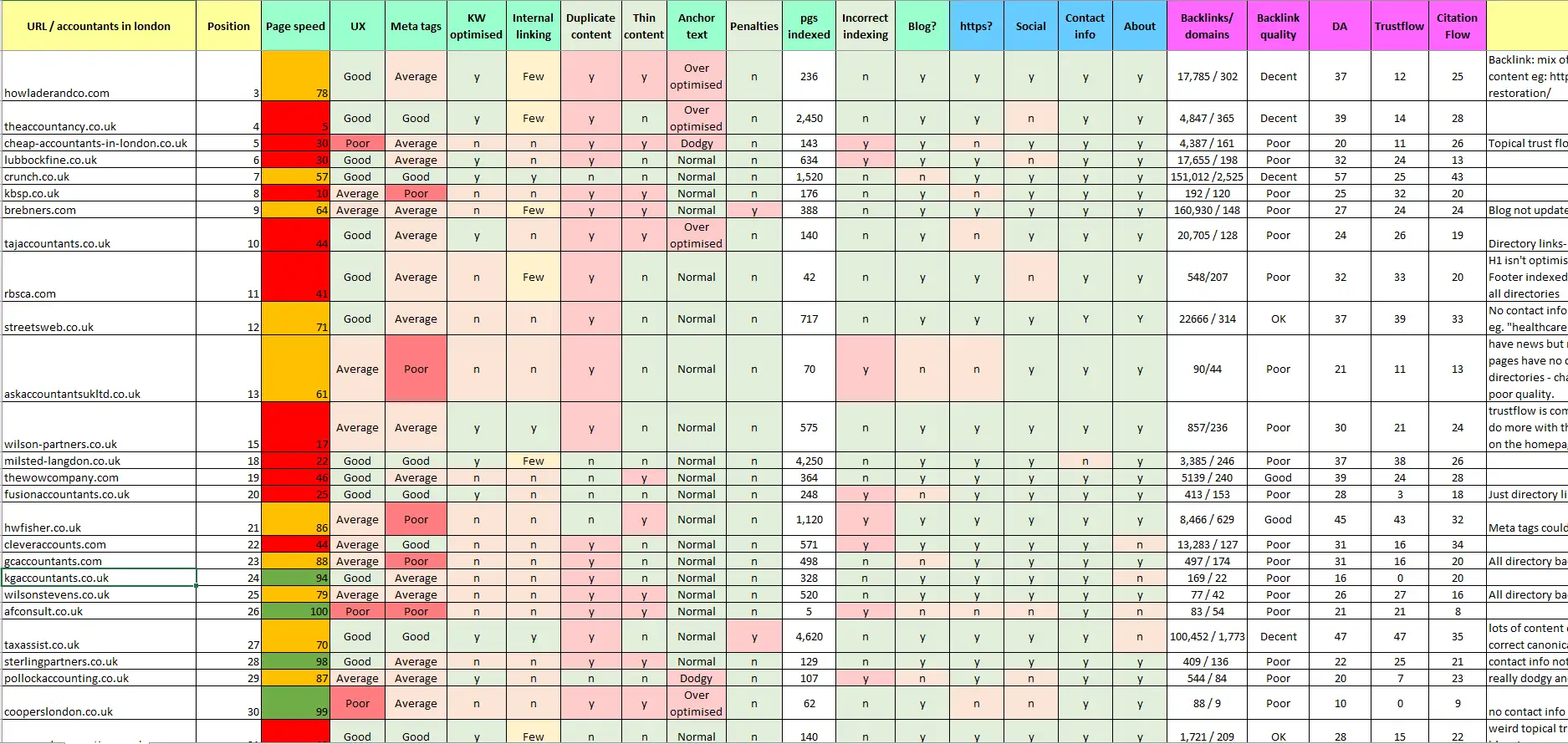
SEO for Accountants: Common Issues and How to Fix Them
“What makes a website rank?”
This is a question pondered by SEO experts, marketing specialists and business owners alike. However, only Google knows the true formula - yet we mere mortals are aware of some of the factors at play and can optimise our sites accordingly.
Interested in how and why websites are ranking in different competitive industries, we got our SEO team on the case. We decided to look at SEO for accountants, and what SEO metrics they are neglecting that could be stopping them from reaching the coveted first page of Google.
Skip to contents:
1. The Methodology
We chose a keyword that most businesses within the industry would like to rank for, and that had a decent search volume. We settled on the term “accountants in London” (search volume of 3,600 a month, according to SEMRush). Our SEO team then conducted a technical SEO audit of the companies ranking on the first 3 pages of Google’s search results* to see what firms were doing right, and wrong, in terms of their SEO efforts.
*SERP results taken from SEMRush, in order to eliminate location or previous search biases.
Our audit took into account a large number of metrics, including:
- Page speed: Using Google’s PageSpeed Insights, we calculated the page speed of a site. The scale used was 90-100 (fast) 50-89 (average) 0-49 (slow). An important metric to monitor, as Google has stated they “included page speed as a ranking factor for mobile searches in 2018.”
- User Experience: As well as analysing the general feel of a website, and how easy it was to navigate, we took into account some of Google’s UX playbooks, like this one for the finance industry.
- Meta Tags: We examined both meta titles and meta descriptions of indexed pages upon a ‘site:’ command.
- Keyword optimisation: We considered whether pages were optimised for industry keywords and whether they were ranking for anything already.
- Internal linking: We considered whether pages made use of anchor text to link to internal pages and create an interconnected website, without any ‘orphan’ pages (a page with no other pages linking to it.)
- Duplicate content: We tested strings of text from websites, and put them into Google surrounded by quotation marks, to see if the content had been duplicated across the web and whether another website ranked first for the content.
- Thin content: This is defined as any site content that offers little-to-no value (think pages with just a few lines of text)– Relevance and usefulness are increasingly important in the eyes of Google.
- Anchor text linking to the site: We wanted to see whether any dodgy link-building tactics, guest blogging or bought links could be seen. We used Majestic to do a link audit for this.
- Potential Google penalties: To do this, we used SEMRush to look at any sharp/overnight drops in organic traffic that the site has found tricky to recover from.
- Incorrect pages indexed on Google: We conducted a “site:” command and looked at the pages indexed- asking ourselves if there were there any parameter URLs indexed or error pages.
- Blog: We sought to determine whether the business had a blog- an important way to build your online presence.
- E-A-T: Standing for Expertise, Authoritativeness, Trustworthiness; we looked at information such as an about us page, contact info, and whether they had links to social media pages. All factors which determine the authoritativeness and trustworthiness of a company.
- Backlinks: We looked at the number of backlinks, and their quality – did they come from authoritative and relevant websites?
- DA: Domain authority is a metric from Moz, defined as a domain score out of 100 that attempts to predict how well a website will rank.
- Trust flow: and how this number compared to their citation flow (the number should not show much disparity).
2. The Results

So, what did our technical SEO study reveal, and do we have any SEO tips for accountants?
5 most common technical SEO issues found on accountancy sites*
73% had poor backlink quality
70% featured duplicate content
67% exhibited a lack of internal linking
60% lacked proper keyword optimisation
44% were victim to slow page speed
*% of sites with this technical SEO issue, flagged during an SEO audit.
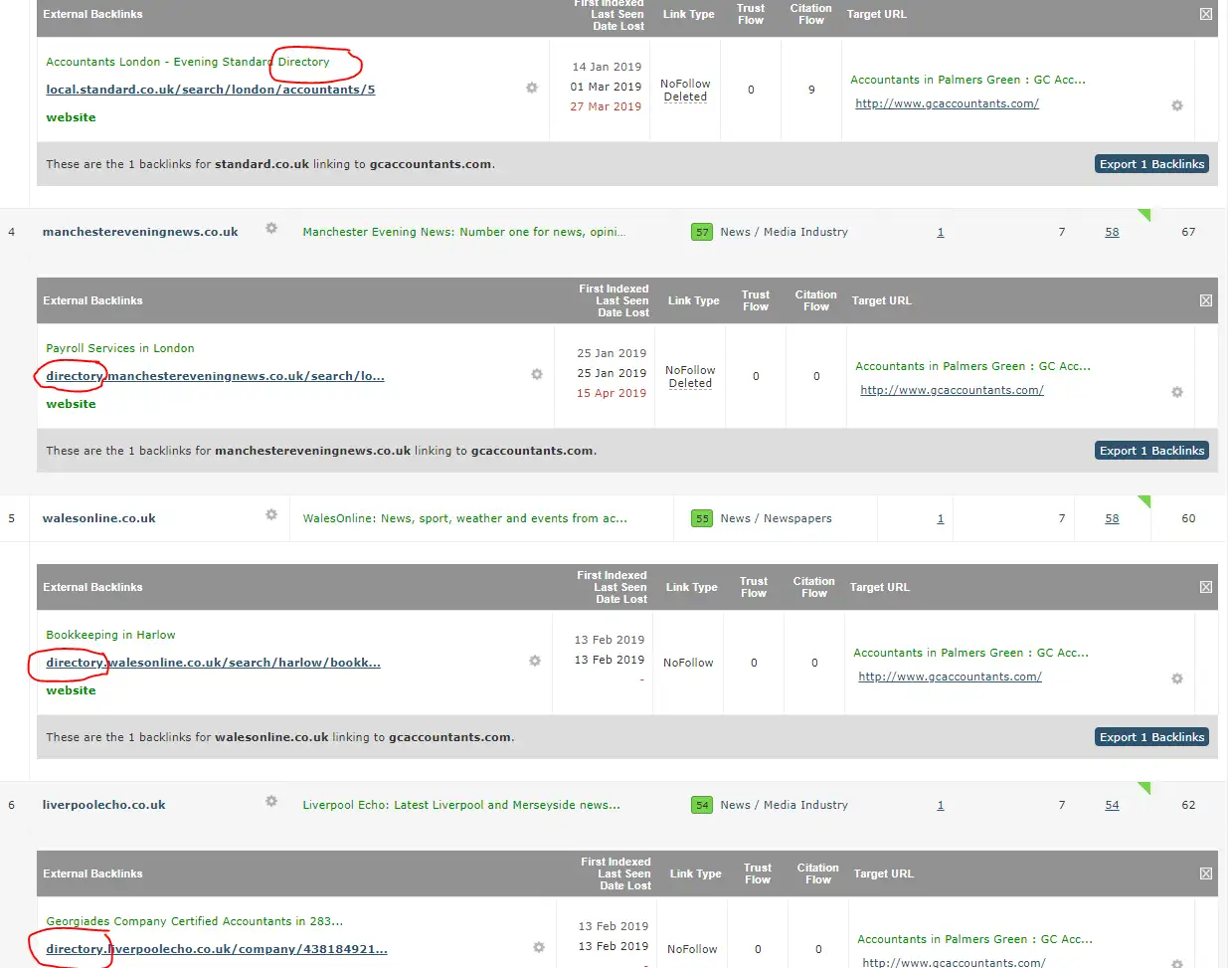
Our results revealed that SEO in accountancy clearly did not place any emphasis on link earning. 73% of the companies we audited had low-quality websites, or in some cases, no websites, linking back to them. The vast majority of accountancy link building relied on backlinks from directories- a tactic used back in the early days of SEO, which is largely ineffective now.
We can see this tactic used by GC Accountants, their link audit (pictured) revealed that they haven’t conducted any digital PR or other link-building strategies. Currently ranking in position 23 on the results page, a few powerful and relevant links could help boost them to a higher rank.
Our study also revealed, more shockingly, that 7 in 10 accountancy websites had simply copied their content from other sites. Many had copied the definition of terms like “VAT returns”, and the copy about the services they offer, from other websites. We also found duplicate content on some blog posts too.
Example of duplicate content issues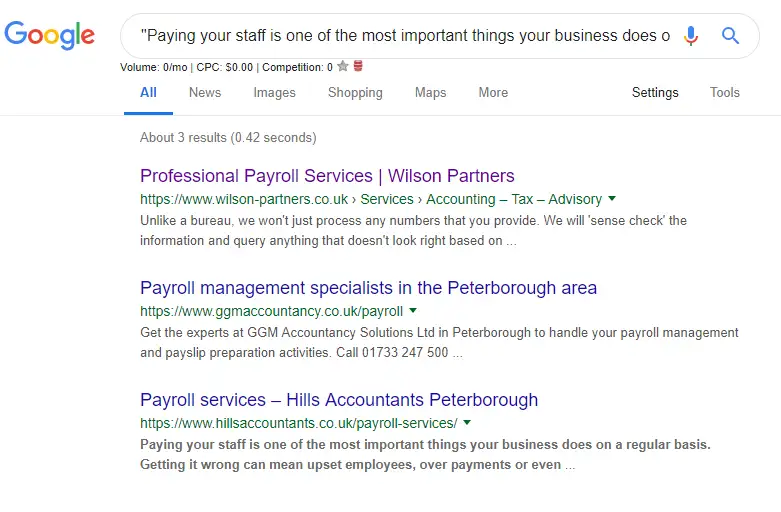
We took a string of text from the payroll services page of provider Wilson Partners and entered this into Google. We found that, although Wilson Partners ranks number one for the content, it had been copied by two other accountancy companies.
 We would advise re-writing this text in order to provide something more unique to the reader and to Google.
We would advise re-writing this text in order to provide something more unique to the reader and to Google.The third most common accountancy SEO issue picked up in our audits was a lack of links between pages, otherwise known as internal linking. 67% of the sites analysed failed to link between pages, making their structure unclear to Google.
Other common issues included a lack of proper keyword research, or h1s and h2s not being used to full effect. Indeed, 60% had not optimised their pages fully for a focus keyword, or at times any keywords at all. This can be seen on accountancy firm RBSCA’s payroll services page.
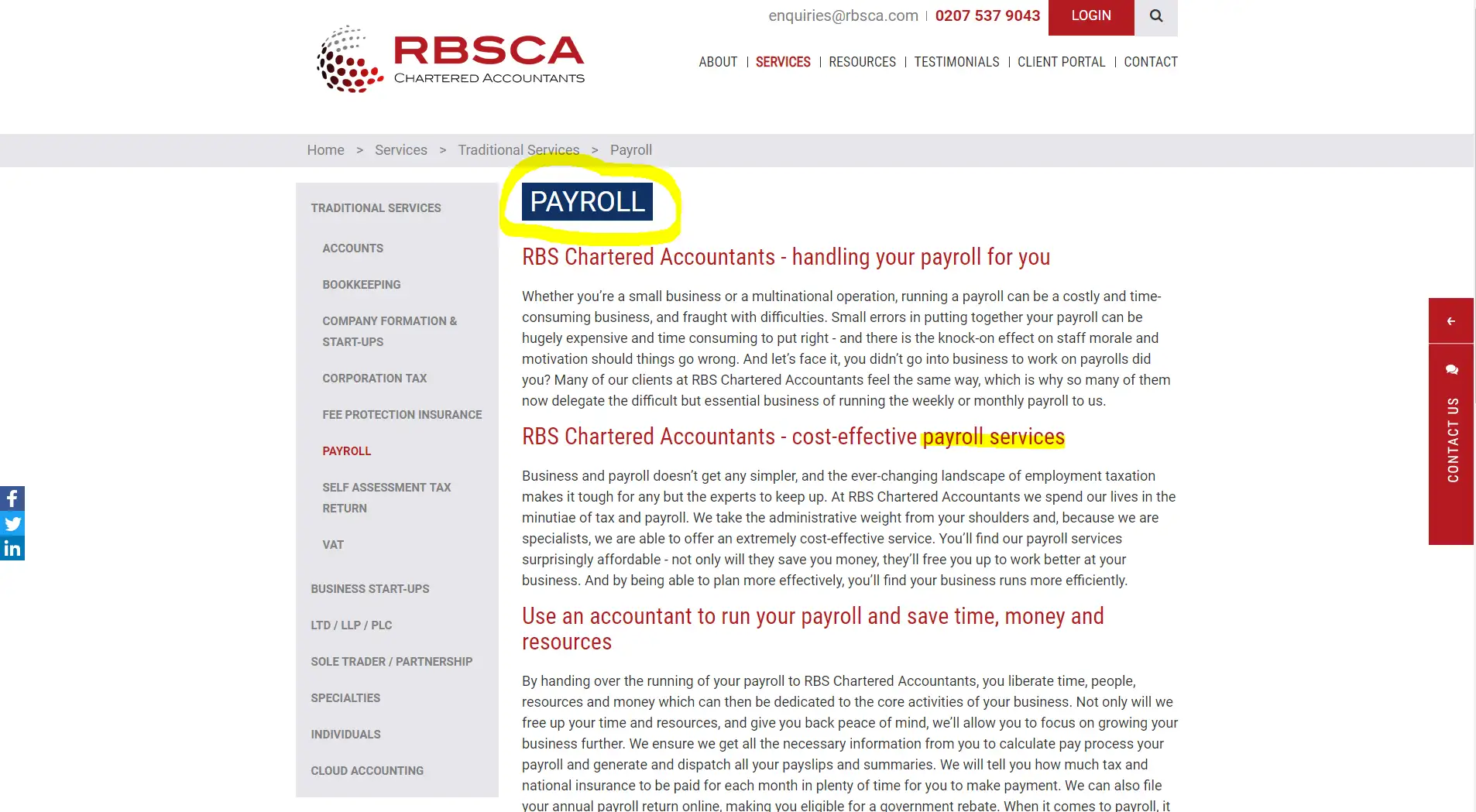
Although they have mentioned “payroll services” in the h2, their h1 is simply “Payroll” which doesn’t help google understand exactly what their page offers a reader. They could further optimise this page by using keyword synonyms and consequently get it ranking for these terms too, which it currently does not.

In the image above you can see that it is only ranking for the term “rbs payslip” – not relevant to the page, and certainly not going to bring in any converting traffic. RBSCA currently rank 11 – just missing out on a top ten spot – so some keyword or search intent optimisation could really benefit them.
Finally, the fifth most common SEO issue for accountancy businesses was a slow page speed, with 44% exhibiting a below-average page speed. They could look at improving their page speed by finding out what resources take the longest to load and fixing this, updating bloated code, or even replacing a poorly constructed CMS (Content Management System).
To see the full results of our SEO audits, please download the excel we compiled here.
3. SEO Tips for Accountants
So, what do we suggest that accountants do to improve their SEO? Learning some SEO basics would certainly go a long way. In addition to focusing on the most common SEO issues named above, here are some of our other suggestions:
1. Do not neglect meta tags
Our study concluded that the majority of accountancy business meta tags were just ‘average’ (51%). They earned this score due to not being fully optimised for a keyword, being too long, or not being descriptive enough to earn a click from the SERP.
Any example of a bad meta title, or one not reaching its full potential, can be seen below in a screenshot taken from a ‘site:’ command of accountancy firm AskAccountants.
 The vast majority of their meta titles are simply the name of the page followed by ‘Accountants in London - ASK Accountants - London Accountants’.
The vast majority of their meta titles are simply the name of the page followed by ‘Accountants in London - ASK Accountants - London Accountants’.
This is an ineffective use of meta titles. Not only does the repeated mention of ‘accountants’ and ‘London’ seem slightly spammy, but it will not help their click-through rate (CTR).
They are not setting themselves apart enough from the competition with these underwhelming titles.
Oliver Sissons, Reboot’s SEO manager, stated that AskAccountants are
“Not taking the opportunities to target long tail variations, which could bring more targeted traffic.”
For example, “services” could be changed to “accountancy services” or an even longer tail version.
You also need to watch out for your meta descriptions – which should give the searcher enough information about what your page is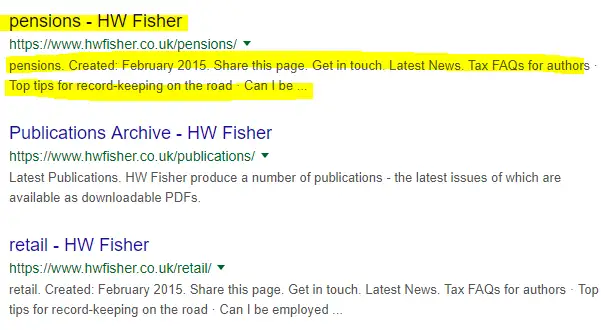 about, whilst also enticing them to click on your result over any of the others.
about, whilst also enticing them to click on your result over any of the others.
Our audit noticed several ineffective meta descriptions, including this one taken from the accountancy website HWFisher.
Not only is the meta title under-optimised, and missing a capital letter, but the description tells us nothing. What about pensions will the page discuss? If the searcher doesn’t know what the page contains, they won’t know if they will find what they need on that page and will be highly unlikely to click on it.
2. Watch out for thin content
As previously mentioned, thin content is defined by Google as pages that “don’t provide users with substantially unique or valuable content”. Our study found that the majority of accountancy sites (53%) did not contain thin content – but 47% could afford to work on this.
An example of thin content can even be seen on page 1 of the SERP. Howlader and Co have created this page on company formation, for example, with the only unique copy on the page stating “we can restore your company” – not offering much value to the reader, and not giving them a reason to follow through on that call-to-action at the bottom (the contact form).
You have done extremely well to get someone all the way from a search to your page- it’s a shame to lose them at the last hurdle due to a lack of interesting content.
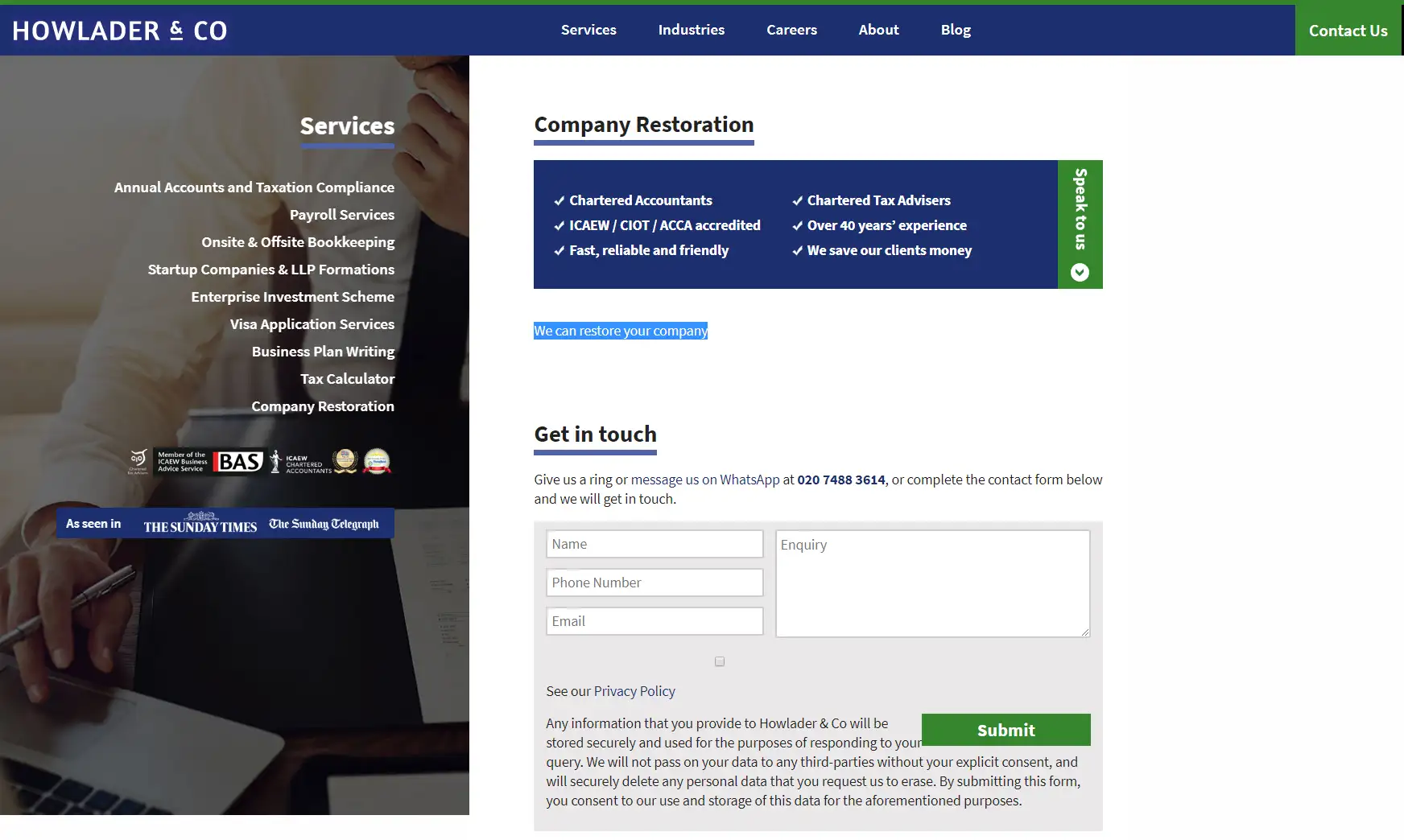
Always offer something unique to your visitors and answer the query that brought them to your page.
3. Ensure only the correct pages are indexed
Our accountancy SEO audit flagged that a third of the sites analysed had pages incorrectly indexed in Google. Furthermore, 60% of the sites that had this issue were on page 2+, revealing that it could be an issue holding them back from climbing the ranks.
To avoid pages that do not exist anymore, or pages with intentionally duplicated content (like a print-friendly version of the page), appearing in the SERP, ensure that you have correctly canonicalised your pages. By doing this, you are telling Google to index just your chosen page version and will avoid a penalty.
 An example we picked up in our study of incorrect indexing came from HWFisher. Our examination of their indexed pages revealed that this page, about a WordPress plugin, had been indexed.
An example we picked up in our study of incorrect indexing came from HWFisher. Our examination of their indexed pages revealed that this page, about a WordPress plugin, had been indexed.
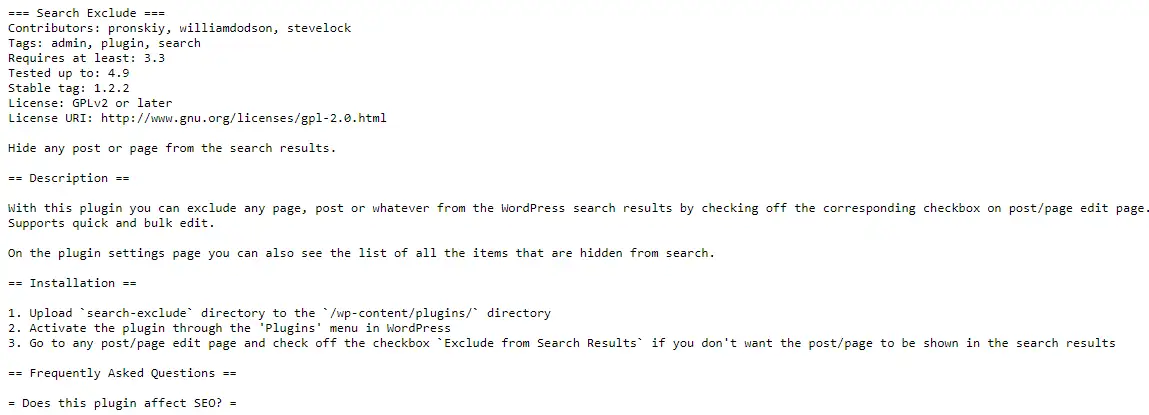
Not only does this seem a little odd to visitors, faced with a page of code, but it also wastes your Google ‘crawl budget’. This is the number of your pages that the search engine spiders will crawl in a day. Essentially what this means is that you shouldn’t be wasting your crawl budget on pages that serve no purpose, when the spiders could be crawling more important ones.
4. Make sure you have optimised for E-A-T
As previously mentioned, E-A-T in SEO has nothing to do with nutrition, and everything to do with “Expertise, Authoritativeness, and Trustworthiness”. This is an especially important factor in the accountancy industry, where legitimacy and trustworthiness are key when dealing with finances.
Our audits uncovered that 20% of the accountancy firms did not have an SSL certificate – meaning their site was http, rather than https – and therefore, coming across as ‘not secure’, and certainly affecting their rankings.
Other important E-A-T factors include: having a social media presence, which astonishingly 27% of the firms audited did not, having their contact info readily available (3% did not) and featuring an ‘about us’ page, where a visitor could better understand your company and who was behind it.13% did not have such a page- although 100% of the results on page 1 of Google did have an about us page. Telling indeed.
5. Develop a blog for your business
As witnessed with thin content issues, it is important to develop the content surrounding your website, and a business blog is a great way to do this. Not only does it give credibility to your expertise within your field, but it helps Google understand what your website is about, and that you have authority within this industry.
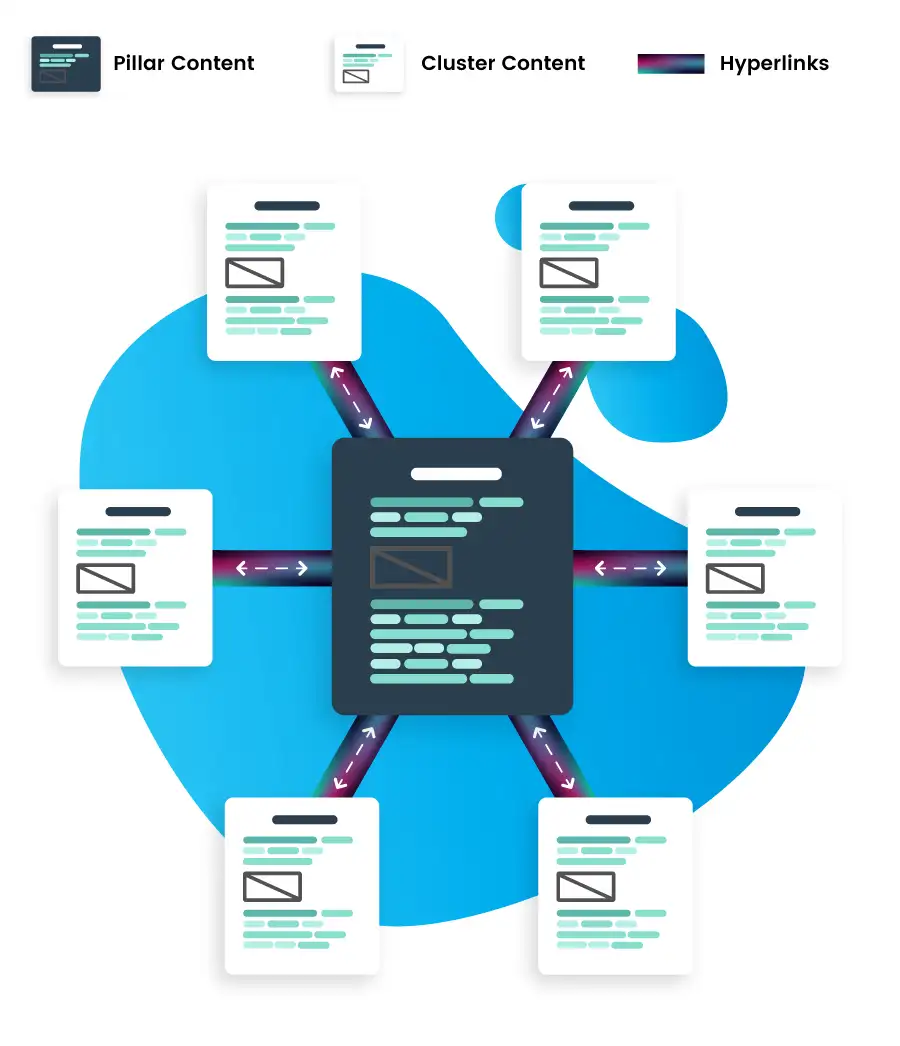 This is especially true if you structure your content into topic clusters.
This is especially true if you structure your content into topic clusters.
Blog posts should include main “pillar” pages that discuss a broader topic in great depth, one that is relevant to your industry (A guide to VAT, perhaps?). Next, you want to create shorter blog posts, called cluster posts, about more niche questions relating to the pillar topic, using longtail terms (‘how to check if a company is VAT registered’ for example).
Then you want to link all those cluster posts to your pillar post, and vice versa, with relevant anchor text (the words you use to hyperlink to another page.)
Our audits revealed that 34% of accountancy firms did not have a blog. Important to note was that 88% of the firms that made it to page 1 of Google DID have a blog and could thus be the reason why they found it easier to rank in the top spots.
We hope that this research can be of some help to you and your business and if you are looking for assistance with your SEO, or any other marketing service, then do not hesitate to get in touch with us today and enquire about our SEO company services.
Page Updated - What Has Changed?
In the interest of pursuing perfection, we have updated some aspects of this blog post to correct grammatical errors and to include any updated links.


